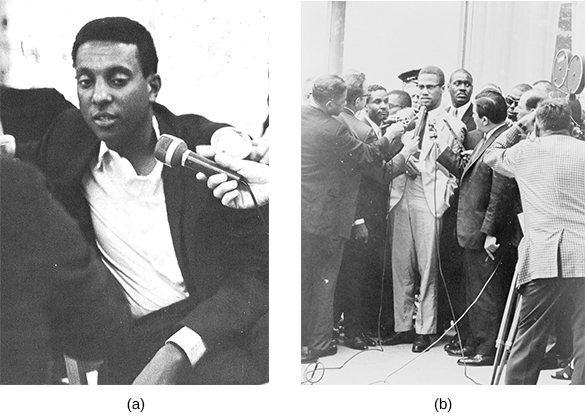| << Chapter < Page | Chapter >> Page > |
Frustration and anger lay at the heart of these disruptions. Despite the programs of the Great Society, good healthcare, job opportunities, and safe housing were abysmally lacking in urban African American neighborhoods in cities throughout the country, including in the North and West, where discrimination was less overt but just as crippling. In the eyes of many rioters, the federal government either could not or would not end their suffering, and most existing civil rights groups and their leaders had been unable to achieve significant results toward racial justice and equality. Disillusioned, many African Americans turned to those with more radical ideas about how best to obtain equality and justice.
Watch “Troops Patrol L.A.” to see how the 1965 Watts Riots were presented in newsreel footage of the day.
Within the chorus of voices calling for integration and legal equality were many that more stridently demanded empowerment and thus supported Black Power . Black Power meant a variety of things. One of the most famous users of the term was Stokely Carmichael, the chairman of SNCC, who later changed his name to Kwame Ture. For Carmichael, Black Power was the power of African Americans to unite as a political force and create their own institutions apart from white-dominated ones, an idea first suggested in the 1920s by political leader and orator Marcus Garvey. Like Garvey, Carmichael became an advocate of black separatism , arguing that African Americans should live apart from whites and solve their problems for themselves. In keeping with this philosophy, Carmichael expelled SNCC’s white members. He left SNCC in 1967 and later joined the Black Panthers (see below).
Long before Carmichael began to call for separatism, the Nation of Islam, founded in 1930, had advocated the same thing. In the 1960s, its most famous member was Malcolm X, born Malcolm Little ( [link] ). The Nation of Islam advocated the separation of white Americans and African Americans because of a belief that African Americans could not thrive in an atmosphere of white racism. Indeed, in a 1963 interview, Malcolm X, discussing the teachings of the head of the Nation of Islam in America, Elijah Muhammad, referred to white people as “devils” more than a dozen times. Rejecting the nonviolent strategy of other civil rights activists, he maintained that violence in the face of violence was appropriate.

In 1964, after a trip to Africa, Malcolm X left the Nation of Islam to found the Organization of Afro-American Unity with the goal of achieving freedom, justice, and equality “by any means necessary.” His views regarding black-white relations changed somewhat thereafter, but he remained fiercely committed to the cause of African American empowerment. On February 21, 1965, he was killed by members of the Nation of Islam. Stokely Carmichael later recalled that Malcolm X had provided an intellectual basis for Black Nationalism and given legitimacy to the use of violence in achieving the goals of Black Power.

Notification Switch
Would you like to follow the 'U.s. history' conversation and receive update notifications?